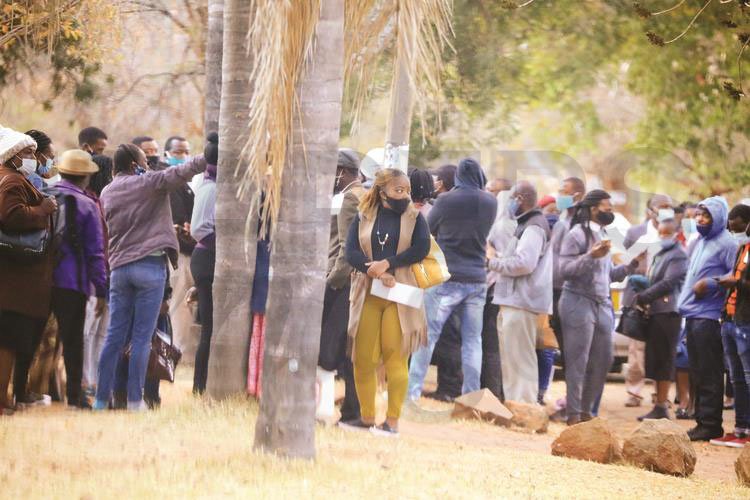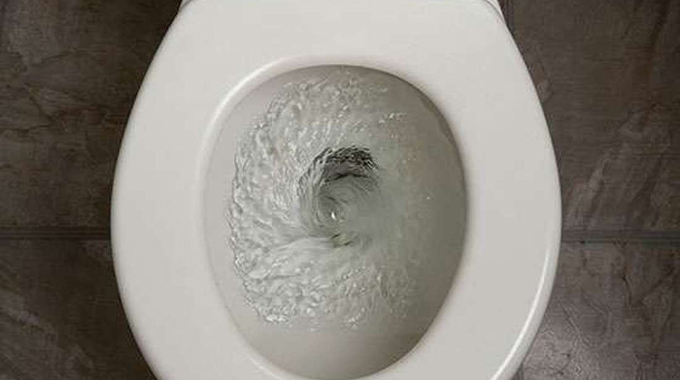Hundreds throng pyramid schemes

Herald Reporter
Two new schemes offering fantastic returns, like doubling money in weeks have opened in Harare, but both want payments in US dollars cash and one of the forms is in Arabic and in the other there are no forms to start with.
Lawyers and experts warn the schemes are either a con, since there is no investment that can double the value of foreign currency in a few weeks, or are the start of Ponzi schemes, where early investors are paid out from the money received from newer investors until the whole scheme crashes.
The schemes are attracting cross border traders and money changers whose businesses were affected by Covid-19.
The dealers’ premises are not labelled and there are no billboards advertising their businesses.

There has been scarce parking for vehicles at the premises where the owners were trying their luck on instant cash
In the first, in Gunhill, as early as 4am, investors (mostly women) brace the cold weather finding their way to a company known as KWD Digital Marketing (also known as Kuwait Dinar) at Number 147 Freedom Legacy Way (originally Borrowdale Road) in Gunhill in flagrant violation of the curfew.
Most of them drive to Gunhill before police start work.
KWD, which is less than two weeks’ old in the business, has attracted most traders since it offers to double their money in four weeks.
The daily crowds will be jostling to be listed among the first 300 people who are served daily with hundreds going back home grumbling after failing to make it into the top 300.
Most of the potential investors do not know the actual name of the company they deal with.
The forms they fill in before giving away their money, are written in Arabic, which cannot be understood by the majority of Zimbabweans.
Throughout a week-long investigation, The Herald established that none of the investors were aware of the name of the company.
Some said it was “Kuwait Dinar” others said Kuwait Dinar Africa while others only called it “KDW”.
None of those interviewed had bothered to check on the ownership of the company despite having the zeal to invest.

A large crowd awaits the opening of business outside KWD premises in Gunhill, Harare, on Wednesday morning
Efforts to get a translation of the inscription on the KWD letterhead failed to yield results.
Officers at the Kuwait Embassy in Harare failed to interpret it, saying they could only read the word “Kuwait” while the other one appeared strange to them.
When The Herald visited KWD premises to hear the management’s side, it emerged that they had already been picked up by the police as part of investigations into the legality of their operations.
The “agreement”, according to legal experts, does not protect the investors in the event of collapse of business or the disappearance of the company owners.
Top Harare lawyer Mr Wellington Pasipanodya described the document as “a voluntary assumption of risk” on the part of the potential investors.
“The schemes have always been there since the 1970s and the cycle is the same. Those that are first to contribute will benefit until a flood of citizens join in the perceived glory of a high return and they end up losing life savings.
“The only recourse will be criminal charges of fraud but however, Ponzi schemes disappear just as quickly as they appear. At the end of the day, there is really no one to hold accountable for the loss because they are not regulated by anyone,” said Mr Pasi.
Another lawyer, Ms Jacqueline Sande described the scheme as illegal.
“This is an illegal scheme just like any other pyramid schemes and ultimately collapses leaving ‘investors’ exposed.
“The scheme will ultimately collapse because the interest rates are so high that they cannot be sustained in the long term. Looking at the documents, the name of the entity is not clear and neither is it’s domicilium.
“This means that in the event of breach, ‘investors’ will be left with no legal recourse as it is not clear who exactly they are dealing with and where to serve legal process in the event of breach.

Police officers question a woman outside KWD premises in Gunhill
Police officers question a woman outside KWD premises in Gunhill
National police spokesperson Assistant Commissioner Paul Nyathi yesterday said investigations were in progress to ascertain the legality of KWD’s operations.
He said a number of managers were picked up yesterday morning to assist the police with investigations.
“I can confirm that we are investigating the company and some employees were picked up today and they are assisting the police with investigations,” he said.
Police investigations followed a raid that saw the arrest of 65 potential investors at the same premises for failing to observe social distancing and violating other Covid-19 laws and regulations.
Women who invest their monies with the schemes formed a WhatsApp group, and this writer managed to join it as part of the investigation.
Sentiments from the 40-member group confirms the scheme is a gamble and most of them are afraid of being swindled.
“Mari taida hedu vasikana uye profit iripo hayo yakawanda but kutaura chokwadi, Kuwait haisati yarongeka hayo. Tingatorwe moyo ne high rate but hii vachiri kure nema standards anoenderana nekubhadhara kwavari kuita mari yepamusoro (We are desperate for money and Kuwait has high interest rates but the standards are still too low),” said one member.
“Kuwait ine rate yakanaka asi hatizivi kuti havazoende kunyika kwavo here (At Kuwait the rates are attractive but we are afraid they might leave the country with our monies)”
In an interview, an illegal foreign currency dealer whose operations were affected by lockdown said she was taking the risk to cushion herself during lockdown.
“We are not allowed in town and our business is low. Investments of this nature will save our businesses from collapse,” she said.
A cross border trader said she could not leave the country during lockdown and investing in such foreign currency schemes was a reasonable option under the circumstances.
“Chances are high that we may lose our money but I understand the early birds make money out of these schemes. I do not mind losing money some six months later because that will be part of my profits.
“I do not care to know who the company owners are. What I want is money and I am taking the risk,” she said.










Comments